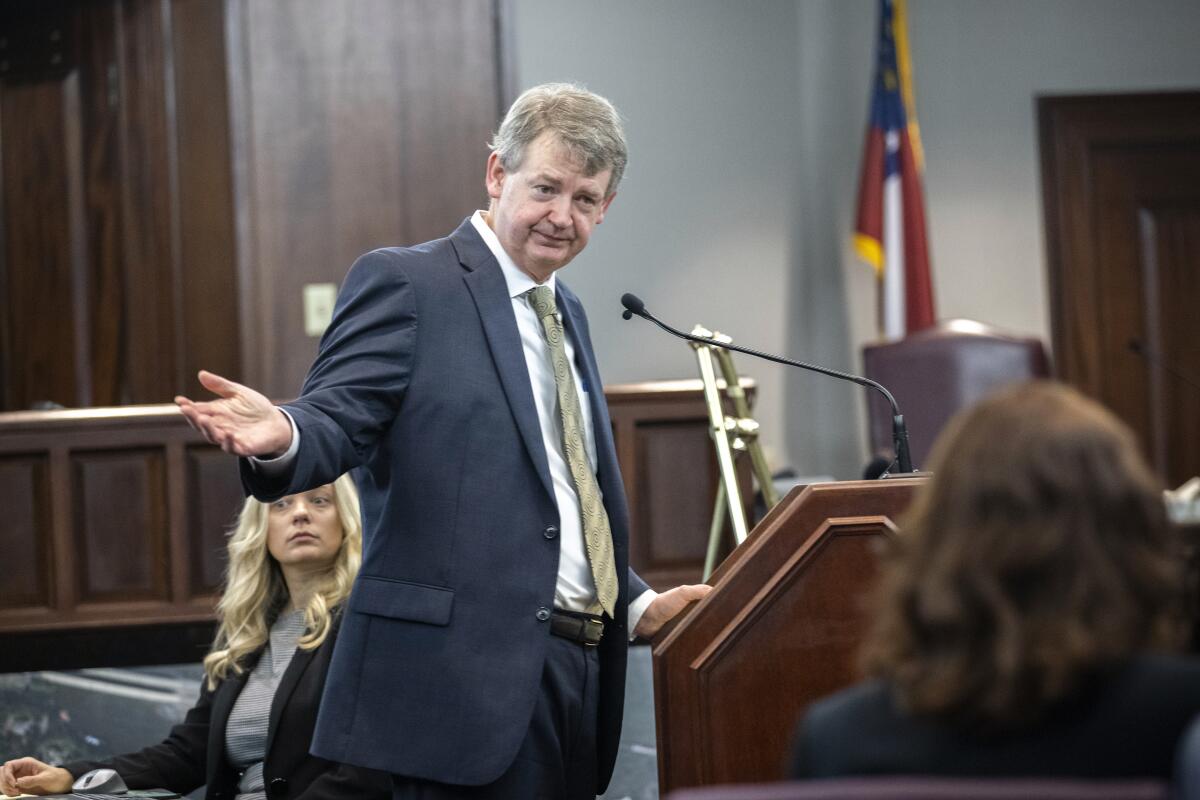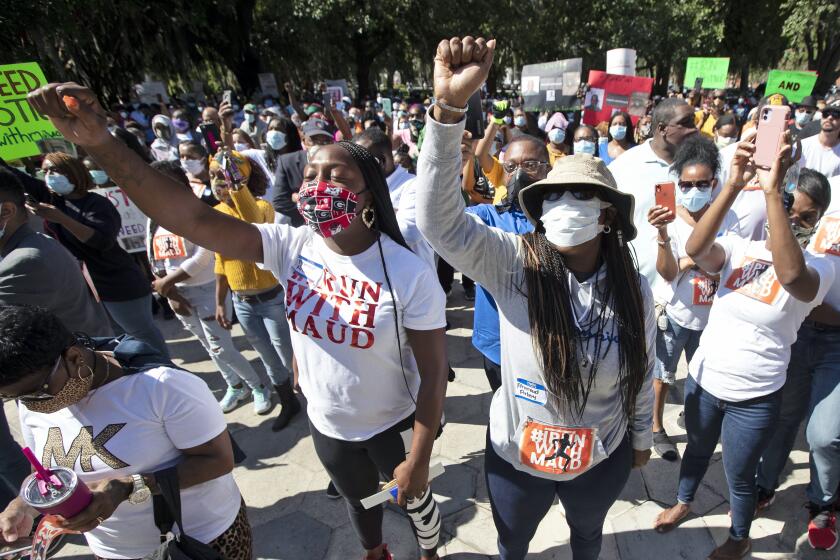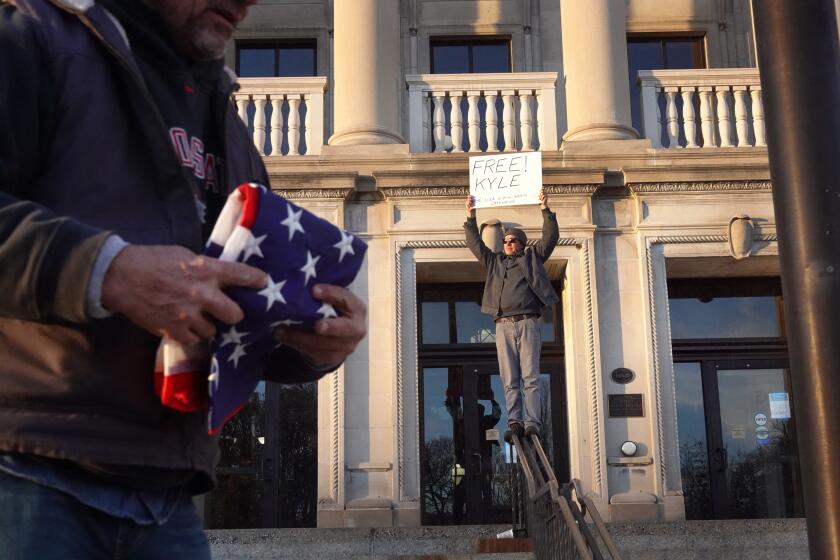Attorneys make closing arguments in Ahmaud Arbery murder trial

- Share via
BRUNSWICK, Ga. — Attorneys made their final arguments to jurors Monday in the murder trial of three white men charged with killing Ahmaud Arbery, with prosecutors stating the 25-year-old was chased “because he was a Black man running down their street” and the defense countering that Arbery was “not an innocent victim” and the defendants had reasonable suspicion to believe he committed burglaries.
Arbery was running in the predominantly white Satilla Shores neighborhood of Brunswick on Feb. 23, 2020, when he was pursued by Gregory McMichael, 65, a former police officer, and his son, Travis, 35. Their neighbor, William “Roddie” Bryan Jr., 52, helped them to corner Arbery, following him in a pickup as he ran down the road.
In weighing whether the defendants are guilty of felony and malice murder, a jury of 12 — made up of 11 white people and one Black person — must consider whether the men “reasonably suspected” that Arbery had committed a felony and was trying to escape.
“All three of these defendants made assumptions … they made their decision to attack Ahmaud Arbery in their driveways because he was a Black man running down their street,” Linda Dunikoski, a special prosecutor from the Cobb County district attorney’s office, told the jury.
“Ahmaud Arbery was under attack,” she added. “... They shot and killed him — not because he’s a threat to them, but because he wouldn’t stop and talk to them.”
Dunikoski told the jury that the men were not attempting to legally carry out a citizen’s arrest. Under Georgia’s citizen’s arrest law — a Civil War-era law that was in effect at the time of the shooting but has since been repealed — a person can detain somebody and may have a firearm while doing so. But to conduct a citizen’s arrest, Dunikoski argued, the defendants would have to witness Arbery actually committing a crime.
“In order to make an arrest of an offender, the offense has to be committed in the private citizens’ presence,” she said. “Do we have that here? No.”
Defense attorneys claimed that Arbery was killed as he resisted a justified legal attempt to stop and detain him so that police could question him about a rash of recent break-ins in the community, about 80 miles south of Savannah.
Jason Sheffield, a lawyer for Travis McMichael and the first of three defense attorneys to speak Monday to jurors, said residents of Satilla Shores were jittery and fearful after a string of trespassing incidents and burglaries.
Arbery, he emphasized, was seen on camera inside a house under construction three different times, including on the day of the shooting. The McMichaels began to follow Arbery, they said, after a neighbor pointed him out as someone who had trespassed onto the empty property.
“Duty and responsibility and following the law will always be intertwined with heartache and tragedy,” Sheffield told the jury. “You are allowed to defend yourself. You are allowed to use force that is likely to cause death or bodily injury if you believe it’s necessary. At that moment Travis believed it was necessary.”
No evidence has emerged that Arbery stole anything.
But Sheffield told the jury that a person does not have to actually steal anything to have committed a burglary. McMichael had “reasonable and probable grounds of suspicion” that Arbery had perpetrated a crime, and that after a struggle in which Arbery tried to take his gun from him, he acted in self-defense in shooting Arbery.
The issue of self-defense was contested, with Dunikoski telling the jury that defendants could not claim self-defense under the law because they were the initial aggressors.
“What does the bully always say: He started it! ... I was defending myself,” Dunikoski said, noting that the defendants had two guns and two pickups and Arbery was unarmed and on foot.
“Use your common sense and put your thinking caps on,” she instructed jurors.
For many Americans, Arbery’s killing harks back to the old Jim Crow days when white mobs hunted black men down and killed them with impunity. In Brunswick, the shooting has sparked an uneasy conversation about race and power.
The slaying was captured in a graphic 36-second cellphone video shot by Bryan: Arbery can be seen jogging along a sun-dappled street toward a pickup parked in the middle of the road as Gregory McMichael stands up in the back of the truck bed with a handgun. Travis McMichael stands beside the open driver’s-side door holding a shotgun.
After running around the truck on the passenger side, Arbery disappears briefly from view. As a gunshot rings out, he can be seen tussling with Travis McMichael on the driver’s side over the gun. A second shot rings out and Arbery wrestles with McMichael. A third shot is fired at point-blank range and Arbery stumbles to the ground.
Laura Hogue, a lawyer representing Gregory McMichael, said Arbery was “not an innocent victim” but a “recurring nighttime intruder” who repeatedly “plundered” through an empty house under construction.
Arbery died, Hogue argued, because of his own bad decisions: She said he chose to enter the partially constructed house, to run when confronted and then, in the final seconds before his death, suddenly veer toward Travis McMichael and tussle with his shotgun.
“No one is saying that Ahmaud Arbery deserved to die,” Hogue told the jury. “He died because, for whatever inexplicable, illogical reason, instead of staying where he was, whatever overwhelming reason he had to avoid being captured that day and arrested by the police, he chose to fight.”
Hogue also cast doubt on the idea that Arbery was just out on a run on the day of the shooting, with a bizarre remark noting he wore khaki shorts and no socks “to cover his long, dirty toenails.”
Arbery’s mother, Wanda Cooper-Jones, abruptly left the courtroom for a few moments. “I gotta get out of here,” she said.
Outside the courthouse later, Cooper-Jones said the defense’s words were “beyond rude.”
The prosecution will offer its rebuttal Tuesday morning.
The jury in this small coastal Georgia city will begin deliberating just days after a jury in Kenosha, Wis., acquitted Kyle Rittenhouse, a white teenager, of all charges, including intentional homicide and reckless endangerment, in the August 2020 killing of two unarmed men and shooting of an armed man during a protest against police brutality.
Kenosha tries to recover after the Kyle Rittenhouse trial.
Tension was high Monday as dozens of people with Black Lives Matter signs and banners assembled outside the Glynn County courthouse chanting, “No justice! No peace!” and “Say his name! Ahmaud Arbery!”
As demonstrators held up images of Arbery, a handful of men and women belonging to the New Black Panther Party patrolled the courthouse grounds with weapons.
In the afternoon, as demonstrators marched around the courthouse chanting, Chatham County Superior Court Judge Timothy Walmsley moved the jury into an interior room of the building.
The McMichaels and Bryan face nine charges, including one count of malice murder and four counts of felony murder. The defendants are also charged with two counts of aggravated assault, one count of false imprisonment and one count of criminal attempt to commit false imprisonment. The minimum penalty for malice murder is life in prison.
All three defendants have pleaded not guilty. The nearly all-white jury — an unrepresentative sample of a county that is more than a quarter Black — must reach a unanimous decision on whether each of the defendants is guilty of murder.
At the time of the shooting, it was legal, under Georgia’s citizen arrest law, for people to arrest someone if a crime was committed “within his immediate knowledge” and they had “reasonable and probable grounds of suspicion” that the person had just committed a felony.
Georgia’s “stand your ground” law also allows the use of deadly force if a person “reasonably believed that they were at risk of serious bodily injury or death.”
Although Travis McMichael fired the shots, Dunikoski argued Monday that his father and Bryan were equally culpable because they aided him in tracking Arbery down.
“They all acted as party to a crime,” Dunikoski told the jurors, arguing that Bryan chased Arbery in a pickup and ran him into a ditch. “The law says that everybody involved is guilty.”
Kevin Gough, the attorney representing Bryan, sought to distance his client from the other defendants. Not only did Bryan not shoot Arbery, he argued, but he didn’t know the McMichaels were armed until moments before Arbery died. Bryan also offered law enforcement all his evidence, he said, including the key cellphone video of the fateful encounter.
“He had good faith from the start,” Gough told the jury. “Roddie Bryan’s presence is absolutely superfluous and irrelevant to the tragic death of Ahmaud Arbery.”
Arbery’s killing shocked Americans on both sides of the political aisle. For many Georgians, it harked back to the days of Jim Crow, when white mobs hunted down black men and killed them with impunity.
In June 2020, a few weeks after a Georgia investigator testified in a hearing that Bryan heard Travis McMichael use a racist slur moments after killing Arbery, the staunchly Republican governor signed into law Georgia’s first hate-crimes bill that imposes additional penalties for crimes motivated by bias.
In May of this year, Gov. Brian Kemp passed a bill that reformed the state’s contentious citizen’s arrest law, significantly restricting the ability of anyone who is not a certified law enforcement officer to arrest someone. Kemp called the old law “antiquated” and “ripe for abuse.”
The state murder trial is not the only opportunity to convict the three white men.
Next year, they face a separate federal trial on hate crimes and kidnapping charges — one count of interference with Arbery’s right to use a public street because of his race and one count of attempted kidnapping. The McMichaels were also charged with one count each of using, carrying and brandishing a firearm during a crime of violence.
More to Read
Sign up for Essential California
The most important California stories and recommendations in your inbox every morning.
You may occasionally receive promotional content from the Los Angeles Times.
















